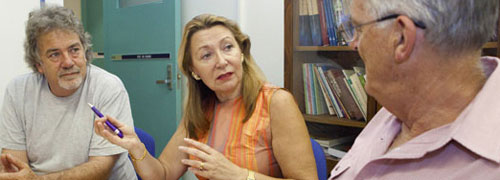Researcher Highlights
The pros and cons of uncertainty
Professor Allyson Holbrook
Professor Allyson Holbrook of the Research Training and Transformational Knowledge program looks at the huge intellectual and emotional changes that occur in PhD candidates and what affect these have on their thinking and attrition rates.

What differentiates an undergraduate degree from a doctorate, besides a few years' extra study and far more knowledge of a subject area? According to Research Training and Transformational Knowledge program leader, Professor Allyson Holbrook, a great deal.
'Everyone who completes a PhD will tell you that they really are not the same as when they began,' explains Professor Holbrook. 'This is because people committed to sustained higher-order thinking activities undergo a transformation, a paradigm shift.'
Holbrook and colleagues have spent 10 years studying how PhD candidates learn and develop. Whereas the undergraduate, and even Masters, student essentially consumes existing knowledge, the doctoral student must learn to question that knowledge and to become a producer of new, original knowledge. This involves a protracted engagement with uncertainty.
'Higher-order thinking exposes you to multiple perspectives, interpretations and explanations,' says Holbrook. 'The once solid epistemological ground beneath your feet can, on close and sustained scrutiny, give way, leaving you only with complexity and uncertainty. "Reality" can become difficult to establish, yet this is the pathway to originality and innovation.'
There can, however, be profound emotional and psychological repercussions. PhD students are more stressed than the general population, often feel intellectually isolated, and may even find their own sense of self destabilised and ultimately transformed by the doctoral experience.
'These intellectual and emotional challenges are a necessary part of the gestational process that produces transformative thinkers – the iconoclasts and innovators. But they're also largely responsible, unfortunately, for the very high attrition rate amongst candidates.'
This attrition rate has been the subject of national and international concern and was the initial stimulus for the group's research. In seeking ways to mitigate it, they have looked at how the quality of research training and supervision could be improved, how PhD students could be made more aware of the challenges they will face and how best to deal with them, and how university administrators and educational policymakers could develop a stronger appreciation of what students go through and of the fact that 'one size fits all' solutions do not work with this heterogeneous population.
Having spent many years establishing a solid evidence base about transformative knowledge processes in higher education, the group is now embarking on a new phase, with plans both to apply what they've learnt and to extend their work to other sectors. The creation of the new Research Training and Transformational Knowledge program in 2013 coincides with and gives additional impetus to, this 'transformation' of the group's own directions and energies.
The plans for applied work in higher education include training for supervisors, students and administrative staff, first at this university and then more widely, including the delivery of online assistance to students nationally. And in a couple of years' time they will bring together for the first time ever the world's experts in the field for an inaugural conference on the research learner.
The group's plans to extend their work to other sectors originate from preliminary work with obstetricians, who are constantly confronted with new information and high levels of uncertainty and stress. The group discovered that the transformational processes and experiences they had mapped in higher education apply equally to those who develop any major new knowledge. So they are now starting to examine what highly innovative individuals in professions are doing to transform their professional work.
They are also planning to create a new network specific to higher-order learning that will branch out from their normal educational contacts to include a targeted group of people working in these higher-level ways in the broader industrial arena, for example in defence, engineering, and international consultancy.
'When we started many years ago, there was minimal research being done on the psychology of higher-order learning and thinking. But now everyone realises how crucial it is to development, to tackling complex problems, to the future. So there's a great deal more interest in it, and in doing it well. There's been a build up to this. Now it's the time for change.'
Find out more
The University of Newcastle acknowledges the traditional custodians of the lands within our footprint areas: Awabakal, Darkinjung, Biripai, Worimi, Wonnarua, and Eora Nations. We also pay respect to the wisdom of our Elders past and present.
